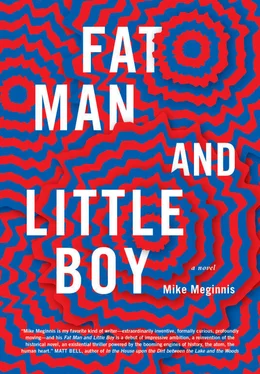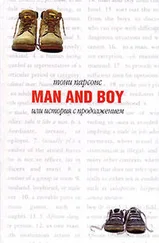“What now?” says Little Boy.
Fat Man pushes dirt over his clothing and pats it down flat as he can. He sweeps loose brush over this, tears leaves from the nearest tree, and drops them on the mound.
“Now we go to town, we avoid soldiers, police, and Japanese in general. We buy some new clothes.” He shakes the cash case. It makes a nearly empty sound. “Cheaper ones. We wait for our passports and plan our escape.”
“They’ll be looking for us,” says Little Boy.
The two policemen, tall and short, limping and not limping, come out the front door of the farmer’s home. They see Fat Man and Little Boy but do not dwell on them. They walk down the road, away, away.
“They’re leaving?” says Little Boy. “Did you know they were in there?”
“You’re full of questions this morning,” says Fat Man. “You done being the big brother?”
“I don’t understand what you’re talking about,” says Little Boy. “Did they not see the bodies? Did they not know it was us?”
“They don’t care,” says Fat Man. “You haven’t figured it out? They don’t care. They don’t care, and you don’t know anything.” He wipes the sticky rice from his face; leaves dirt trails on his cheeks. “Get up on my lap, Matthew,” he says. He pats his knee. He is kneeling.
“What?” says Little Boy.
“Come up here on my lap,” says Fat Man. Pats his knee again. “Come on.”
Little Boy climbs up. Fat Man grabs him by his scruff and forces him down on his belly, across his knee.
“You didn’t protect me,” Fat Man says. “You were supposed to be my big brother. But nobody buys it. I’m the big brother now. And when we are with people, I’m your uncle.”
Fat Man begins to spank him. Little Boy feels each blow.
“Who is your big brother?”
“You are,” says Little Boy, choking back a sob.
They buy new clothes. They sleep behind the home of a man who makes luxury cars. Every morning he sees them waking up in their new clothes and their white skins and thinks they must be customers. They walk away without a word.
Fat Man pawns their fancy suitcase, having cleaned off the blood as best he could. It fetches a very good price. He buys another suitcase: same size, same shape, only gray, simple. They live on the pawn money. They buy their tickets to France.
Fat Man eats constantly. He buys rice and cooks it on his stolen portable stove.
Little Boy doesn’t mention how his brother’s getting fatter. Little Boy eats too-small helpings and burns inside. He makes prolonged eye contact with strange girls on the street. They stare back at him blankly. He finds a black felt hat on the road and he wears it, though it does not match his clothes. He makes Fat Man piggy-back him wherever they go. Because he is the big brother now, and sometimes the uncle. Fat Man never complains.
Nor does he talk anymore when he eats.
Fat Man sits in a small Japanese home, an open suitcase on the floor before him. This is the cash case. It is still clean on the outside. It still opens from the wrong side—the broken hinges, bending at the soft lock. On the other side of the cash case are the two policemen, one short and one tall, both quite starved and deadly thin. They have shown their credentials. They showed their credentials and indicated that Fat Man and Little Boy should come with them. “He’s a child,” said Fat Man. He said this in Japanese. So they took Fat Man away from his brother. They left Little Boy alone.
Little Boy who asked Fat Man, “How do you know Japanese?”
Now the policemen are sitting on the floor on the other side of the open cash case. Its lock will only bend so far. They cannot see what’s in the case, but they know. They put it there. There are inside perhaps a hundred dollars, clumped and clotted by dried blood. Some leaves the brothers may have laid on, now reduced to twiggy skeletons, also crushed. A small, gray mound of dirt or dust. The fat man’s bloodied shirt. The father’s knife. So surely they have seen the father, collected testimony from his wife, his daughter.
They do not ask the Fat Man any questions. Only look at him and wait for him to say what he will say.
They wait.
They only wait.
“My boat is going,” he says, slowly, with some effort. The way he learns he’s learned a word is he says that word. He says, “I need to go also.”
“What did you do?” asks the tall policeman. “What are these?”
Fat Man shakes his head. He means to say he does not understand. He does not know what he understands until he answers. There is language. There is somewhere language. On the air or in him. Like a spider’s web is snared somewhere on his body, but he can only see the trailing thread: there is language.
“We found the body,” says the short one. “We found his knife.”
“What did he do?” says the tall one.
Fat Man takes a twiggy leaf bone from the case and twists it between his fingers. He says, “No.”
He says, “I need to go.”
He lays the leaf’s bone down in the cash case, now an evidence case. He looks at the knife. To see it makes his shoulder ache.
The policemen study his face. For signs of guilt? For feeling? They must want to arrest him. To put him in prison. Yet he is American. There are rumors of American soldiers who travel in rape gangs. It’s said they cut the telephone lines on one city block and move from home to home, raping wives and sisters, mothers and daughters. Some of the women they kill, but mostly they can’t be bothered. There are no trials. If these men cannot be tried, then how can Fat Man? The wife and her daughter, if they have given testimony, may well have told the truth, in which case it was self-defense. If the mother and her daughter lied, then Fat Man is still an American—a well-fed one. One who wears a suit. Though it is always the same suit. He may have connections. Perhaps he knows MacArthur. Or so they may think. Or it may be they are waiting for Fat Man to implicate himself. To break down sobbing. It is not precisely guilt he feels for what he did, though on other days it has been guilt. To what could he confess? Not the pigs. Not the babies. But neither the father: the father least of all. His palms are black. Do they think this normal? Do they see it as a sign of guilt?
It may be the language barrier protects him. They do not know how to interrogate a person with so little Japanese. Are confused by the fact that he has any in the first place. They cannot accuse who they cannot interrogate. Or they empathize, perhaps. They imagine him on the witness stand, if there is a witness stand, if in Japan they have such a thing. They imagine the prodding questions of the prosecutor if there is a prosecutor, or a judge if there is only a judge. They imagine Fat Man listening dumbly, waiting for a word he knows. His pidgin responses. Unresponsive, even inappropriate, puzzling and puzzled. He might think they didn’t care about his guilt if not for the hardness in their faces, if not for their resemblance to the dead soldiers, one short and one tall.
It may be these sickly men could not arrest him if they wanted. These do not carry guns. They have only truncheons. They are perhaps too weak to wield the truncheons. He could maybe crush them, or they may think that he could crush them, that there is no arresting him without the aid of others. He has seen so few other policemen in this city on the coast. They are watching him. He is looking back at them. He is looking at the evidence case. Perhaps they mean it as a gift. He could close the case, slide its hinges into place, and go—a memento. The sound of a knife in a suitcase, the sound of scabbed money. Some dirt. Luggage, only luggage. Only what he carries.
Читать дальше












